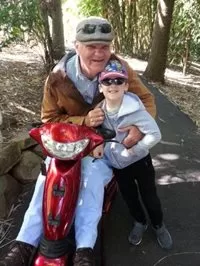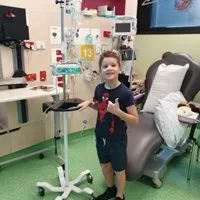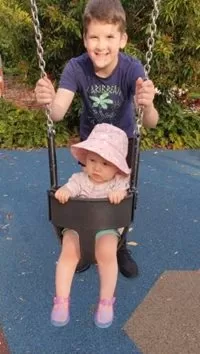
Haemophilia treatment has changed over the years. The story of ‘Poppa’ Erl, grandfather, and grandson Roman, shows just how much. Erl was born in an era where little or no treatment was available and Roman, now 10, has had treatment since he was born. But even for Roman it has been a rocky road. As a small child he developed inhibitors to treatment, which meant his treatment was no longer as effective – and he started to have regular bleeding episodes just like grandfather. Then new haemophilia treatments for inhibitors became available and his life has changed.
Naomi, daughter of Erl and mum to Roman, talked to us about their family history and the ups and downs of their journey.
‘As a child we had a lovely life growing up. I always really admired my Dad’s strength. It was really tough though seeing Dad go through a bleed.’
Erl described his life growing up.
‘We come from a different era., A lot of us have experienced similar things, like haemophilia without treatment, so we do have a broader understanding of what haemophilia is all about and how important it is to look after yourself as much as possible – because haemophilia certainly comes back and bites you, if you’ve grown up when there’s no treatment around.’
When Erl was born there were no transfusions available for haemophilia. By the time Erl was growing up whole blood and fresh frozen plasma became available for treatment, which helped people to survive bleeding episodes but did not stop the swelling and the pain.
‘So with a knee bleed, you would have a knee that was the size of a football, as hard as a rock and unbelievably sensitive and painful. I put up with the pain as long as I could day and night at home, and then ended up being taken to hospital and would get some morphine for the pain. But you couldn’t move your leg; you would be out of action for months. It would take many, many weeks before the swelling went down and before the movement returned. It was nothing to be in hospital for three months or six months at a time, waiting for this to settle down and trying to get back on your feet and get your muscle strength back. It would be six months from the beginning of a bleed in the knee before you could take weight or even begin to start walking again.’ (National Haemophilia No. 174, June 2011)
The gene alteration causing haemophilia is always passed on from a father with haemophilia to his daughters and for Naomi and Erl this created a close relationship.
‘I knew that I was a carrier from a very young age; I guess it’s just always been a part of who I am and haemophilia has just always been there. I certainly always felt a special connection with Dad because of it; I knew it was a rare condition and that made it kind of special in a sense.’
‘My partner David always knew I was carrier and my Dad did have the “talk” with him before we got engaged to make sure that he understood what it meant to have a possible future with haemophilia; of course talking is fine but living through it with your own child is completely different.’
When Naomi and David decided to start a family, they found out the sex of the baby before birth to prepare the birth plan and knew that they were having a little boy.
Roman was diagnosed with severe haemophilia just after being born. Even though she knew it was a possibility, Naomi still found it difficult to come to terms with the diagnosis.New parents can always be anxious about their baby, but for Naomi she would have extra worries about Roman’s haemophilia. How would she know if he was having a bleed? Would he be OK? As Roman become mobile they would constantly hover over him trying to prevent accidents that could potentially turn in to a bleeding episode.
Visits to the hospital to treat bleeds were also upsetting for Naomi, especially when she had to watch her little baby having a needle in his vein to infuse the factor – trying to stay brave for Roman, but inside feeling very emotional.
Then when Roman was 2 years old, he developed inhibitors, which are antibodies to treatment so that it doesn’t work as well. He had a port-a-cath device surgically inserted into his chest so he could have regular prophylaxis treatment, which was every single day.
So often Roman would get spontaneous bleeds, he would just wake up in pain. It just became our new normal to drop everything, go to the hospital and spend the next week or so dealing with a bleed.
But life does eventually get easier, explained Naomi.
‘Once they get older, when they are sure on their feet, they can tell you when they are having a bleed. They can verbalise what they are feeling in their body or tell you what happened exactly when they got hurt.’
Ironically, Roman did miss out on plenty of experiences just like his grandfather did when he was a child.

‘When he started school, he spent some time in a wheelchair recovering from bleeds. This was an emotional challenge for Roman – he didn’t want to be different to the other kids and worried the other kids would see his port-a-cath through his school shirt.’
‘He often missed out on friends or family gatherings because of bleeds and was unable to join in with his friends if their birthday parties had trampolines or a jumping castle because they were a risk for him getting a bleed. We even spent a couple of Christmas Eves in hospital and Christmas Days with a bleed. We never went on a holiday because we were worried about being too far from the hospital, him getting an infection in the port-a-cath, getting a bleed, or even just how we would manage to pack all the gear that we need to do his daily treatment.’
‘And then this incredible opportunity came about. There was a new treatment that that raises the factor 8 levels 24/7, prevents bleeds even for those with inhibitors AND was to be given subcutaneously [under the skin] every fortnight! We had only dreamed about such a product, but now it is a reality. Roman now just has one small needle every fortnight. The whole process takes 10 minutes.’
‘Roman is now 10 years old. The last few months Roman has started to play sports. He enjoys table tennis and Little Athletics. We still can’t believe how much he can do now and not get a bleed. It is pretty amazing and it is certainly life changing for him. It has really boosted his confidence. He can now participate in the sports and activities that his friends do.’
Erl’s experiences over his lifetime meant he has had a lot to offer Roman, Naomi and David. Living through a childhood with treatment shortages, he knew what having an inhibitor would mean for Roman.
‘Dad is really the only person who truly understands what we are all going through and I think that mutual understanding has helped us both over the years.’
Erl also has a lot to teach Roman about coping with haemophilia and getting the best out of life.
‘My Dad is doing ok – he has plenty of issues to deal with but he keeps on going. He is pretty incredible. He gets out and about a lot. He loves to go for coffee and cake and is always somewhere enjoying events, wildlife and sunshine.’
‘Roman and Dad share their experiences with photos when they have a bleed, and Dad sends a photo to Roman to show what it looks like when he is at the hospital having treatment. When Roman was younger, he built a “walking stick just like Poppa’s” with clip together blocks. There is a special bond between Poppa and Roman.’
Erl and Roman have lived different childhoods and have different stories to tell about their experience living with Haemophilia but now they are both on the same new treatment and they both get to enjoy life with less bleeds.



